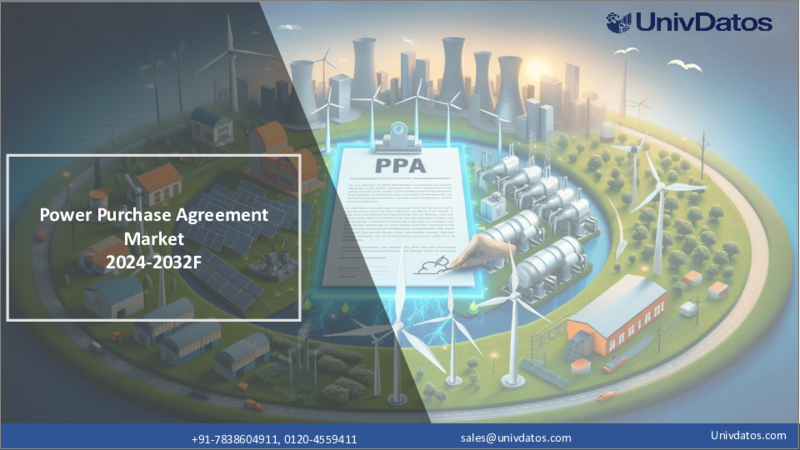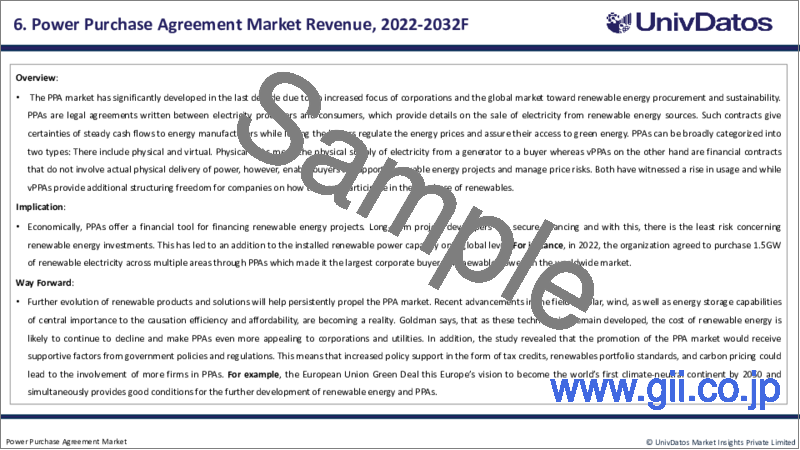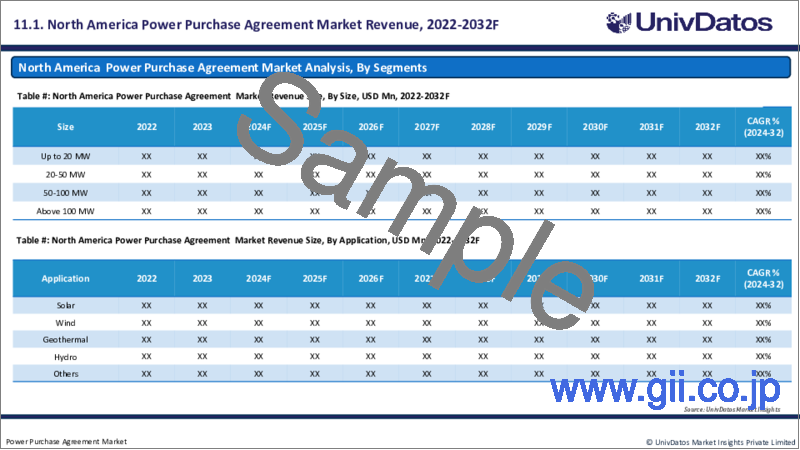|
|
市場調査レポート
商品コード
1534952
電力購入契約(PPA)市場:現状分析と予測(2024年~2032年)Power Purchase Agreement Market: Current Analysis and Forecast (2024-2032) |
||||||
カスタマイズ可能
|
|||||||
| 電力購入契約(PPA)市場:現状分析と予測(2024年~2032年) |
|
出版日: 2024年07月01日
発行: UnivDatos Market Insights Pvt Ltd
ページ情報: 英文 145 Pages
納期: 即日から翌営業日
|
全表示
- 概要
- 目次
電力購入契約(PPA)とは、通常、発電事業者と需要家(電力消費者または取引業者)の2者間の長期電力供給契約を指すことが多いです。PPAは、供給する電力量、交渉価格、会計、違反した場合の罰則など、契約の条件を定義します。PPA市場が急成長しているのは、環境問題に対する規制の圧力や、再生可能エネルギーの導入によるコスト削減など、多くの促進要因があるためです。PPAは、エネルギー価格の変動に関連するリスクを軽減し、長期引取契約を通じて規模の大きなプロジェクトに財務的なクッションを提供する、財務的に準備の整った受け入れ可能なモデルです。例えば、2022年、Amazonは、米国、スペイン、英国を含む複数の国で、合計270万kW以上の再生可能エネルギー容量の新規PPAを発表しました。これらの契約は、2025年までに全世界の事業で再生可能エネルギー100%を達成するというAmazonのコミットメントの一環です。
市場は、タイプ別に物理的デリバリーPPA、バーチャルPPA、ポートフォリオPPA、ブロックデリバリーPPA、その他に分類されます。2023年の電力購入契約(PPA)市場では、バーチャルPPAが大きなシェアを占めています。VPPAは、場所やリスク管理の面で柔軟性を提供します。VPPAは、物理的な引き渡し契約ではなく、金融契約であるため、企業はエネルギーの物理的な引き渡しを受けることなく、再生可能エネルギープロジェクトを支援することができます。これは、地理的に分散した事業を展開する企業にとって特に有利です。
電力購入契約(PPA)市場は、カテゴリー別に企業、政府、その他に分類されます。企業セグメントは、電力購入契約(PPA)において主要な市場シェアを獲得しています。多くの企業は、二酸化炭素排出量を削減し、環境・社会・ガバナンス(ESG)クレデンシャルを高めるために、野心的な持続可能性目標を設定しています。PPAは、再生可能エネルギーを確保するための直接的かつ効果的な方法を提供するため、こうした持続可能性の目標に合致します。例えば、Google, Apple, Microsoftなどの企業は、再生可能エネルギーで電力を供給するために、大規模なPPAを締結しています。
電力購入契約(PPA)市場は、規模別に20MW以下、20~50MW、50~100MW、100MW超に区分されます。100MW超の規模セグメントが電力購入契約(PPA)の大きなシェアを占めています。大規模発電所は、大企業や政府の高いエネルギー需要を満たすために不可欠な、大量のエネルギーを生み出すことができます。1つのプロジェクトから大量の再生可能エネルギーを生産できるため、これらの発電所はPPAにとってより魅力的なものとなります。
電力購入契約(PPA)市場は、用途に基づき、ソーラー、風力、地熱、水力、炭素回収貯蔵、その他に分類されます。様々な再生可能エネルギー用途の中でも、ソーラーエネルギーは電力購入契約(PPA)市場で大きなシェアを獲得しています。ソーラーエネルギーは、過去10年間で大幅なコスト削減が見られました。技術的知識の向上、大量購入、生産効率の向上により、ソーラーパネルやその他の製品のコストを下げることが可能になりました。さらに、太陽電池の効率向上、高度なソーラーエネルギー貯蔵システムの開発など、ソーラー技術の一貫性が向上し、ソーラープロジェクトの実現可能性と魅力が向上しています。
電力購入契約(PPA)の市場導入に関する理解を深めるため、市場は北米(米国、カナダ、その他北米地域)、欧州(ドイツ、英国、フランス、スペイン、イタリア、その他欧州地域)、アジア太平洋地域(中国、インド、日本、その他アジア太平洋地域)、世界のその他の地域における世界のプレゼンスに基づいて分析されています。北米は電力購入契約(PPA)市場で大きなシェアを獲得しています。これは、支援政策、再生可能資源の十分な利用可能性、持続可能な開発における企業の高い所有権など、いくつかの要因によるものです。米国は、再生可能エネルギープロジェクトの促進に関する施策を実施していることに注目することが重要です。PPAを通じた再生可能エネルギーの促進は、投資税額控除(ITC)のような連邦政策や、再生可能エネルギーポートフォリオ基準(RPS)のような州政策によって促進されています。Google, Amazon, Microsoftなど北米を代表する世界企業の多くが、持続可能な開発目標を掲げています。これらの企業は、コストと温室効果ガス排出量を削減するために、再生可能エネルギーから電力を購入するPPAをますます利用するようになっています。
市場に参入している主な企業には、General Electric, Siemens, Shell Plc, Statkraft, Fairdeal Greentech India, NextEra Energy Resources, Enel Green Power, Orsted, Brookfield Renewable Partners, TotalEnergiesなどがあります。
目次
第1章 市場イントロダクション
- 市場の定義
- 主な目的
- ステークホルダー
- 制限事項
第2章 調査手法または前提条件
- 調査プロセス
- 調査手法
- 回答者プロファイル
第3章 エグゼクティブサマリー
- 業界要約
- セグメント別見通し
- 市場成長の強さ
- 地域展望
第4章 市場力学
- 促進要因
- 機会
- 抑制要因
- 動向
- PESTEL分析
- 需要側分析
- 供給側分析
- 合併と買収
- 投資シナリオ
- 業界考察:大手スタートアップ企業とその独自の戦略
第5章 価格分析
- 地域別価格分析
- 価格に影響を与える要因
第6章 世界の電力購入契約(PPA)市場の収益、2022-2032年
第7章 タイプ別の市場分析
- 物理的デリバリーPPA
- バーチャルPPA
- ポートフォリオPPA
- ブロックデリバリーPPA
- その他
第8章 カテゴリー別の市場分析
- 企業
- 政府
- その他
第9章 規模別の市場分析
- 20MW以下
- 20~50MW
- 50~100MW
- 100MW超
第10章 用途別の市場分析
- ソーラー
- 風力
- 地熱
- 水力
- 炭素回収・貯留
- その他
第11章 地域別の市場分析
- 北米
- 米国
- カナダ
- その他北米地域
- 欧州
- ドイツ
- 英国
- フランス
- スペイン
- イタリア
- その他欧州地域
- アジア太平洋地域
- 中国
- 日本
- インド
- その他アジア太平洋地域
- 世界のその他の地域
第12章 バリューチェーン分析
- 限界分析
- 市場参入企業一覧
第13章 競合情勢
- 競合ダッシュボード
- 競合市場ポジショニング分析
- ポーターのファイブフォース分析
第14章 企業プロファイル
- General Electric
- Siemens
- Shell Plc
- Statkraft
- Fairdeal Greentech India
- NextEra Energy Resources
- Enel Green Power
- Orsted
- Brookfield Renewable Partners
- TotalEnergies
第15章 頭字語と前提条件
第16章 付録
A Power Purchase Agreement (PPA) often refers to a long-term electricity supply agreement between two parties, usually between a power producer and a customer (an electricity consumer or trader). The PPA defines the conditions of the agreement, such as the amount of electricity to be supplied, negotiated prices, accounting, and penalties for non-compliance. The PPA market is growing fast because of the many drivers such as environmental concerns regulation pressures and the cost savings that accrue from adopting renewable energy. PPAs are a financially ready-made and acceptable model that reduces the risks associated with price fluctuation in energy and that presents projects at scale with a financial cushion through long-term offtake agreements. For instance: In 2022, Amazon announced several new PPAs, totalling over 2.7 GW of renewable energy capacity across multiple countries, including the U.S., Spain, and the U.K. These agreements are part of Amazon's commitment to achieve 100% renewable energy across its global operations by 2025.
Based on type the power purchase agreement market is segmented into physical delivery PPA, virtual PPA, portfolio PPA, block delivery PPA, and others. Virtual PPA caters to a significant share of the power purchase agreement market in 2023. VPPAs provide flexibility in terms of location and risk management. They are financial contracts rather than physical delivery agreements, allowing companies to support renewable energy projects without taking physical delivery of the energy. This is particularly advantageous for companies with geographically dispersed operations.
Based on category, the power purchase agreement market is categorized into corporate, government, and others. The corporate segment acquires a major market share in power purchase agreements. Many corporations have set ambitious sustainability targets to reduce their carbon footprints and enhance their environmental, social, and governance (ESG) credentials. PPAs provide a direct and effective way to secure renewable energy, thus aligning with these sustainability objectives. For instance, companies like Google, Apple, and Microsoft have all entered substantial PPAs to power their operations with renewable energy.
Based on size, the power purchase agreement market is segmented into Up to 20 MW, 20-50 MW, 50-100 MW, and Above 100 MW. The above 100 MW size segment caters to a significant share of the power purchase agreement. Large-scale power plants can generate significant amounts of energy, which is essential for meeting the high energy demands of large corporations and governments. The ability to produce a substantial amount of renewable energy from a single project makes these plants more attractive for PPAs.
Based on application, the power purchase agreement market is classified into solar, wind, geothermal, hydro, carbon capture storage, and others. Among various renewable energy applications, solar energy has acquired an extensive share in the Power Purchase Agreement (PPA) market. Solar energy has seen a significant reduction in costs over the past decade. Increased technological knowledge, volume purchasing, and gains in production efficiencies have made it possible to bring down the cost of solar panels and other products. Moreover, there have been improvements in the consistency of solar technology delivering continuing improvements in such areas as solar cell efficiency developing sophisticated solar energy storage systems has improved the feasibility and appeal of solar projects.
For a better understanding of the market adoption of the power purchase agreement, the market is analyzed based on its worldwide presence in countries such as North America (U.S., Canada, and the Rest of North America), Europe (Germany, UK, France, Spain, Italy, Rest of Europe), Asia-Pacific (China, India, Japan, and Rest of Asia-Pacific), Rest of World. North America has acquired a significant share of the power purchase agreement market. This is due to several factors like supportive policies, sufficient availability of renewable resources, and high company ownership in sustainable development. It is important to note that the United States has put in place measures regarding the promotion of renewable energy projects. The promotion of renewable energy through PPAs is facilitated by federal policies like the Investment Tax Credit (ITC) and state policies like Renewable Portfolio Standards (RPS). A lot of the leading global companies from North America including such big movers as Google, Amazon, and Microsoft, have pinned sustainable development goals for themselves. More and more these companies are relying on PPAs to purchase power from renewable sources to cut costs and greenhouse emissions.
Some of the major players operating in the market include General Electric, Siemens, Shell Plc, Statkraft, Fairdeal Greentech India, NextEra Energy Resources, Enel Green Power, Orsted, Brookfield Renewable Partners, and TotalEnergies.
TABLE OF CONTENTS
1.MARKET INTRODUCTION
- 1.1. Market Definitions
- 1.2. Main Objective
- 1.3. Stakeholders
- 1.4. Limitation
2.RESEARCH METHODOLOGY OR ASSUMPTION
- 2.1. Research Process of the Power Purchase Agreement Market
- 2.2. Research Methodology of the Power Purchase Agreement Market
- 2.3. Respondent Profile
3.EXECUTIVE SUMMARY
- 3.1. Industry Synopsis
- 3.2. Segmental Outlook
- 3.2.1. Market Growth Intensity
- 3.3. Regional Outlook
4.MARKET DYNAMICS
- 4.1. Drivers
- 4.2. Opportunity
- 4.3. Restraints
- 4.4. Trends
- 4.5. PESTEL Analysis
- 4.6. Demand Side Analysis
- 4.7. Supply Side Analysis
- 4.7.1. Merger & Acquisition
- 4.7.2. Investment Scenario
- 4.7.3. Industry Insights: Leading Startups and Their Unique Strategies
5.PRICING ANALYSIS
- 5.1. Regional Pricing Analysis
- 5.2. Price Influencing Factors
6.GLOBAL POWER PURCHASE AGREEMENT MARKET REVENUE (USD BN), 2022-2032F
7.MARKET INSIGHTS BY TYPE
- 7.1. Physical Delivery PPA
- 7.2. Virtual PPA
- 7.3. Portfolio PPA
- 7.4. Block Delivery PPA
- 7.5. Others
8.MARKET INSIGHTS BY CATEGORY
- 8.1. Corporate
- 8.2. Government
- 8.3. Others
9.MARKET INSIGHTS BY SIZE
- 9.1. Up to 20 MW
- 9.2. 20-50 MW
- 9.3. 50-100 MW
- 9.4. Above 100 MW
10.MARKET INSIGHTS BY APPLICATION
- 10.1. Solar
- 10.2. Wind
- 10.3. Geothermal
- 10.4. Hydro
- 10.5. Carbon Capture and Storage
- 10.6. Others
11.MARKET INSIGHTS BY REGION
- 11.1. North America
- 11.1.1. U.S.
- 11.1.2. Canada
- 11.1.3. Rest of North America
- 11.2. Europe
- 11.2.1. Germany
- 11.2.2. UK
- 11.2.3. France
- 11.2.4. Spain
- 11.2.5. Italy
- 11.2.6. Rest of Europe
- 11.3. Asia-Pacific
- 11.3.1. China
- 11.3.2. Japan
- 11.3.3. India
- 11.3.4. Rest of Asia-Pacific
- 11.4. Rest of World
12.VALUE CHAIN ANALYSIS
- 12.1. Marginal Analysis
- 12.2. List of Market Participants
13.COMPETITIVE LANDSCAPE
- 13.1. Competition Dashboard
- 13.2. Competitor Market Positioning Analysis
- 13.3. Porter Five Forces Analysis
14.COMPANY PROFILED
- 14.1. General Electric
- 14.1.1. Company Overview
- 14.1.2. Key Financials
- 14.1.3. SWOT Analysis
- 14.1.4. Product Portfolio
- 14.1.5. Recent Developments
- 14.2. Siemens
- 14.3. Shell Plc
- 14.4. Statkraft
- 14.5. Fairdeal Greentech India
- 14.6. NextEra Energy Resources
- 14.7. Enel Green Power
- 14.8. Orsted
- 14.9. Brookfield Renewable Partners
- 14.10. TotalEnergies






